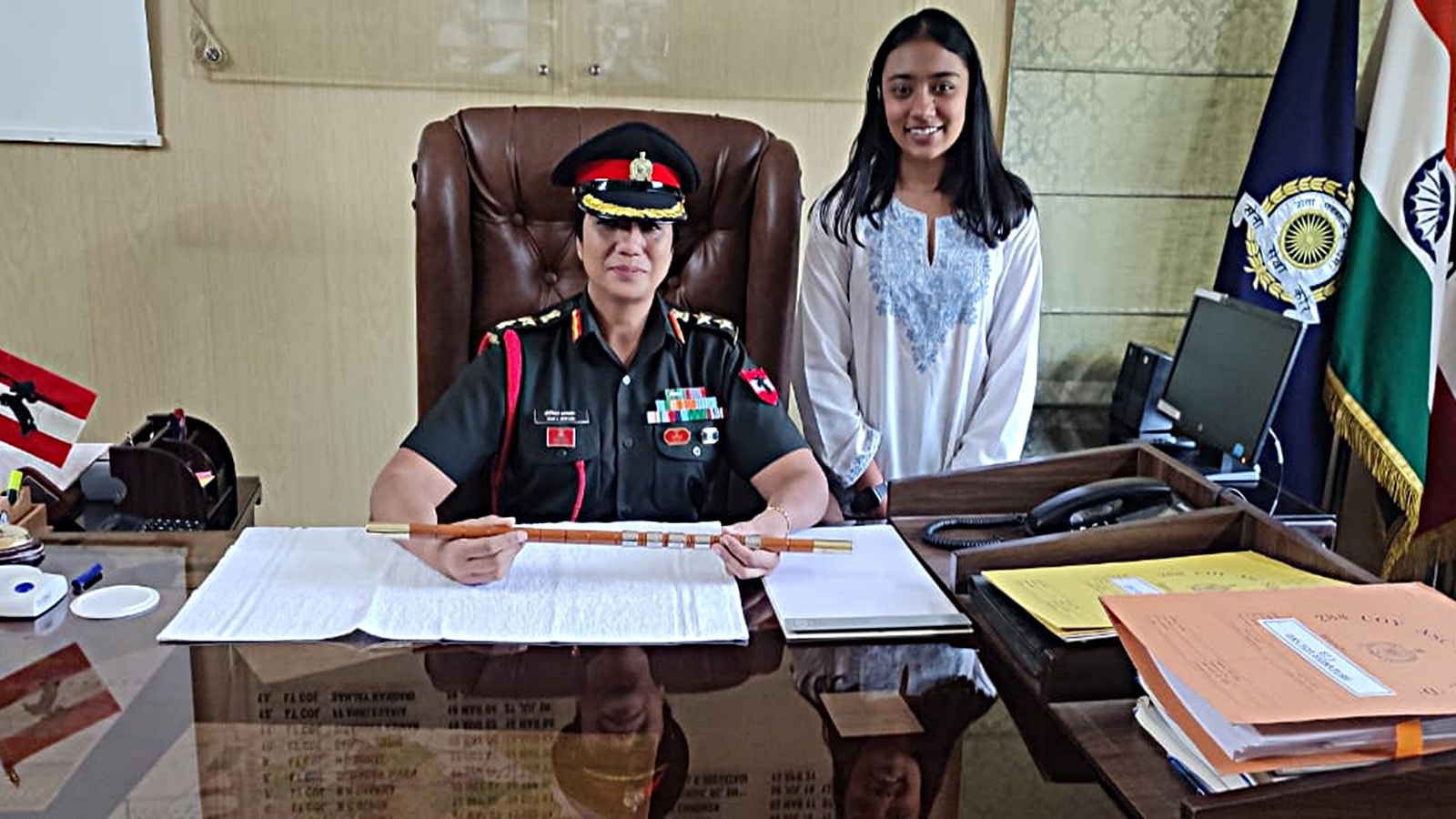Among the first batch of the lady officers to command a unit is Colonel Sonia Anthak, who commands the supply depot.
Colonel Sonia, who also served with the United Nations Mission at Golan Heights (UNDOF) has recently received the GOC-in-C South Western Command Unit Citation on the occasion of Army Day 2024. This is the first award conferred on the unit ever since its raising, making it a proud moment not only for the colonel but for entire unit.

How does it feel to be part of the Indian Army?
I am born and brought up in the armed forces environment. My father retired from the Air Force as a air commodore. Joining the forces was my passion. I feel like my dream has come true and I have been able to carry forward the legacy of my family. I would say, being a part of the uniformed force, is a blend of pride, honour and a sense of achievement. When I don the uniform everyday it gives me a feel that I am doing something worthwhile for the nation.
How do you see your job different than others?
Serving the Indian Army is a unique and at the same time a demanding profession that requires dedication, sacrifice, discipline and a commitment to serve the nation. In the army, you are not just serving a job, you are serving something greater than yourself, embodying values of courage, integrity and patriotism that define the essence of being a soldier. In the Army, we work together and win together.
Do you experience resistance when you are leading men? How do you deal with it? What are the challenges you face?
No, the men only look forward to the leadership skills and traits in their officers. If they see that you are professionally competent, capable of taking challenges, you have the drive and focus and of course you are genuinely concerned about their welfare, then there is no gender barrier in they accepting you as their leader. Maybe a lady officer, would have to walk an extra mile initially to prove this but at the end of the day the moment the men realise that there is no difference in the quality of leadership and the work done is for the betterment of the organisation, their aspirations are being addressed, they open heartedly accept you irrespective of your gender.
Infact, now many lady officers are in command and each one is doing a marvelous job without no issues at all.
You joined the army as a Short Service Commission officer. Did you imagine yourself to be commanding a unit?
I joined the Indian Army because I had a passion for it. When you join a place which has been your dream and you are committed to do work for earning respect, render selfless service and be appreciated for your doings, it gives you an internal happiness, zeal and a sense of pride to keep doing well without any expectations. In Bhagavad Gita, it is said we should do our best in all that we do, without worrying about the results ie ‘Karm kar, phal ke chinta na kar’. Dividends of hard work and staying committed, I would say are evident today.
Story continues below this ad
Being a lady officer, how do you carry out work-life balance ?
As a lady officer, achieving work-life balace can be challenging but important. Prioritising tasks, setting boundaries, and scheduling time for self-care are crucial. Additionally, having a supportive network, delegating tasks when possible, and recognising the value of downtime can all contribute to a healthy balance between work and personal life.
Is a woman officer required to behave like a “man in uniform”?
No, firstly a woman dosen’t have to be “a man in uniform”. Women in uniform bring their unique perspectives, skills and strengths, just like their male counterparts. It’s important to embrace diversity and recognise the value that individuals of all genders bring to the military and other uniformed professions. Hence, gender does not dictate how someone performs his/ her duties.
How can woman support other women officers/ troops?
In the army, supporting one another is not just about tactics and strategy, it is about companionship and unity. It is about fostering a supportive and inclusive environment. This can include mentoring junior lady officers and troops and providing equal opportunities and recognition, offering emotional support, lifting each other up in the toughest of times and celebrating their victories — no matter how big or small — together.
‘After death of my husband, immense courage was needed to start afresh’
Back in 2004, she was a housewife. Little did Major Vishav Vandana know that her life would overturn when she lost her husband — a serving captain in the army.
Story continues below this ad
Major Vandana overcame the pain she went through and emerged as a fighter. Today, she heads a key department in the Indian Army. Raising her daughter, managing the work, she does it all, happily and with content.
 Major Vishav Vandana with her daughter. (Express Photo)
Major Vishav Vandana with her daughter. (Express Photo)
How does it feel to be a part of uniformed force?
I feel honoured and proud of being a part of uniformed force. After I lost my husband, it required immense courage to stand up and start everything afresh. And my parents helped me gather the courage for it. To be in the uniform is a matter of immense honour for me especially when it was like a transformation from a housewife to an army officer.
To be able to don the uniform came with scores of challenges. For a year and a half after my husband passed away, I even worked as a convent school teacher while my parents took care of my daughter who was two years old then. But I had passion for the army. And you know I was the oldest in the academy when I went for training.
How do you see your job different than any other?
Well, I feel the thrill, adventure and exposure of various places and cultures in my field, and also the technological advancements make it entirely different than others. Every day is a new day in service of your nation and its people.
Story continues below this ad
What are the challenges you face or faced?
While training, I would say there were times when I used to call up my mother and break down, because it was a journey from a housewife to an army officer. But when you have the passion and determination, you can overcome any challenge. Later, when I joined the forces, every day teaches and empowers you to be a “new you”. There are no hindrances in being a lady officer.
Is a woman officer required to behave like a “man in uniform”?
When you wear this uniform, there is no man or a woman. Gender has nothing to do with the capability here in our institution.
How about work-life balance?
I think anyone with a positive attitude towards life can balance the work and life easily. The only thing required is distribution of time and how you manage among competing priorities. Once that is done, you will not feel any aspect being devoid of your time. When I went to the academy and later I was sent to a field posting where families couldn’t join, my daughter could join me only when she was eight years old and she remained with my parents. There are times when you have to balance it out, but if you have the grit you will do it.
Is the Indian Army a good career for women? What would you say about army opening the doors of NDA to lady cadets?
Yes, it is an excellent career opportunity for women. There is so much to learn and contribute in the service to your nation. I would day that it is not just a noble endeavour but an opportunity for girls to unleash their potential and become a leader in India’s most prestigious institution.
Story continues below this ad
‘Being a woman officer can be both challenging and rewarding’
I was so apprehensive initially and today after joining the forces, I myself feel so empowered to face any kind of situation in life
During this year’s Republic Day parade in Delhi, Captain Akansha Gomes led as the Contingent Commander for Advance Radio Frequency Monitoring system, an indigenous developed highly advanced system. A first generation officer, Captain Akansha got commissioned exactly four years before on March 7, 2020.
 Captain Akansha Gomes after her passing out parade. (Express Photo)
Captain Akansha Gomes after her passing out parade. (Express Photo)
How does it feel to be part of uniformed force ?
Being a woman officer in the Indian Army can be both challenging and rewarding at the same time. Women officers undergo rigorous training and face similar responsibilities and expectations as their male counterparts. We contribute to various roles within the army, including combat, logistics, intelligence, and administration. Most importantly, it is more about breaking barriers in traditionally male-dominated fields. We take pride in our contributions to national security and the opportunity to prove our capabilities and dedication to our profession.
How do you see your job different from others?
Women officers in the Indian army proudly perceive their job totally differently than their civil counterparts. They are the trailblazers. Being a woman officer gives us the role of breaking barriers and paving the way for future generations of female officers. Though earlier it was only short service, now women officers have started getting inducted in NDA on a permanent commission. It also means being a role model for other women and girls, both within the military and in society at large.
Story continues below this ad
What are the challenges you faced ?
I have faced various challenges along my journey including societal stereotypes, physical demands and serving in distant inhospitable terrains. Through determination, resilience, and unwavering commitment, I have overcome these obstacles, continually striving to excel and contribute positively to my unit, my corps and the organisation.
Being a lady officer, how do you carry out work-life balance?
I have completed exactly four years in service today. Every day is a new day for me where I learn and contribute to accomplish the army’s objectives. We as woman officers in the Indian army like their counterparts in many other professions, often face challenges in balancing their work and family life. However, having a supportive family/spouse, healthy work environment, understanding seniors and most importantly a good time management often helps in dealing with it all.
Is a woman officer required to behave like a “man in uniform”?
In the Indian Army, women officers are expected to fulfil their duties with the same level of professionalism, dedication and commitment as their male counterparts. While there may be certain physical requirements and expectations associated with specific roles, such as combat positions, women officers are not required to be a man in uniform. Instead, they are valued for their unique skills, perspectives and contributions to the organisation. The goal is to create an inclusive and equitable environment where all officers, regardless of gender, can thrive and contribute effectively to the Indian Army’s mission.



 Major Vishav Vandana with her daughter. (Express Photo)
Major Vishav Vandana with her daughter. (Express Photo) Captain Akansha Gomes after her passing out parade. (Express Photo)
Captain Akansha Gomes after her passing out parade. (Express Photo)





